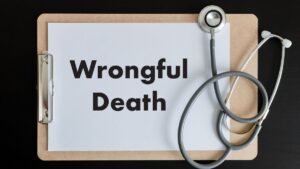 Our elderly loved ones deserve the best care possible. When we choose a nursing home to provide that care and they fail to do so, it is devastating for the family members who have to pick up the pieces. When a family loses someone to negligence or abuse at a nursing home, a wrongful death nursing home lawsuit can help them hold the at-fault parties accountable. Read on to learn more about wrongful death and what is required to prove your case.
Our elderly loved ones deserve the best care possible. When we choose a nursing home to provide that care and they fail to do so, it is devastating for the family members who have to pick up the pieces. When a family loses someone to negligence or abuse at a nursing home, a wrongful death nursing home lawsuit can help them hold the at-fault parties accountable. Read on to learn more about wrongful death and what is required to prove your case.
What Is Wrongful Death?
Wrongful death occurs when someone dies due to the negligence or misconduct of another party. Most states only permit immediate family members to file a wrongful death nursing home lawsuit. Usually, spouses, parents, children, and domestic partners can file wrongful death lawsuits. In certain circumstances, grandparents, siblings, and other family members might be able to file. If your loved one’s death was caused by nursing home abuse or neglect, speak to an attorney to learn whether you are eligible to file a wrongful death lawsuit.
How to Prove Wrongful Death in a Nursing Home
Proving a nursing home wrongful death is complex and requires the help of a qualified attorney. Your attorney investigates your case to find the evidence you need to prove wrongful death in a nursing home. Proving a nursing home wrongful death requires establishing the following elements of negligence:
- Duty. A nursing home facility and its employees have a duty to provide a basic standard of care when caring for nursing home residents, and they must provide essential services. Essential services include water, food, clothing, shelter, hygiene, and medical care.
- Breach. A breach of duty occurs when a nursing home facility or its employees fail to meet the standard of care. Both actions and inaction can be a breach of duty.
- Causation. You must prove the breach of duty caused your loved one’s death. This might seem straightforward, but it can be challenging to prove given other circumstances that may have existed at the time, including the resident’s age, physical condition, and other similar factors.
- Damages. Surviving loved ones must show they suffered damages due to their loved one’s death. Recoverable damages include economic and noneconomic losses that can help your family move forward.
It’s not uncommon for vulnerable seniors to suffer neglect and abuse at the hands of those we trust to care for them. An experienced attorney can evaluate your case and help you understand your legal options.
Contact Us
At Senior Justice Law Firm, we help seniors and their families pursue justice against the nursing homes, assisted living facilities, and hospitals that harmed them. With over fifty years of experience in the courtroom, we are committed to maximizing every client’s recovery. At Senior Justice Law Firm, our number one priority is helping seniors and their families hold the parties responsible for their injuries accountable. Contact one of our compassionate and qualified nursing home abuse attorneys today. There is no obligation to pursue your claim, and the consultation is free.


